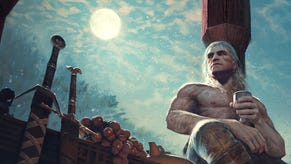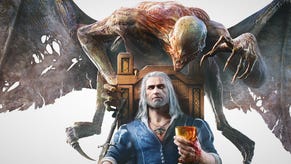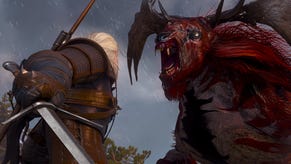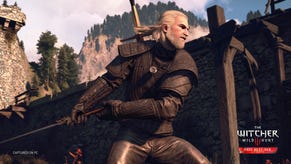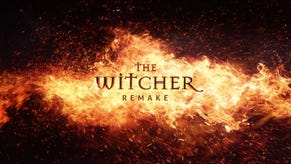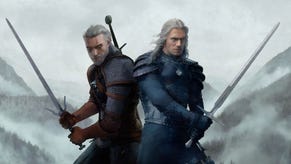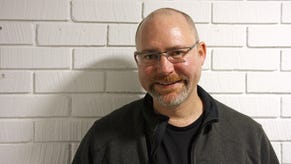The Witcher
Hands on with CD Projekt's monster-slaying RPG.
"RPGs are like McDonald's burgers," says one of the team at CD Projekt. They're everywhere, and it's difficult to distinguish between them. RPGs are all the same. Rat-punching to level up. Twee character design. A world where the good battle dark forces to free the land of tyranny. And orcs. Orcs everywhere. Punch them. Level up. Go on. Now go and buy a leather waistcoat.
The Witcher hopes to be different. For a start, the Elves are terrorists. Not those whimsical, mincing Elven wimps that skip around the woods strumming a lute. These bad boys carry the fantasy equivalent of the AK-47. The characters, atmosphere and environment are key elements to The Witcher, and the features that stand out the most during Eurogamer's hands-on time with the game at the Polish developer's studio.
Be witched
Unless you're one of our readers in Polska (hello Jaroslaw and Lech in Warsaw!), chances are you haven't read Andrzej Sapkowski's books based on The Witcher. The game takes place in Sapkowski's dark fantasy universe - a world where there's no clear division between good and evil - and players are encouraged to play as their own conscience sees fit. While many fantasy stories may deal with contemporary themes as a subtext, The Witcher builds its story and world around themes of racism, terrorism, genocide and pollution. Time will tell if the finished story lives up to its intentions, but the team at CD Projekt certainly believe they're capturing The Witcher's nasty side.
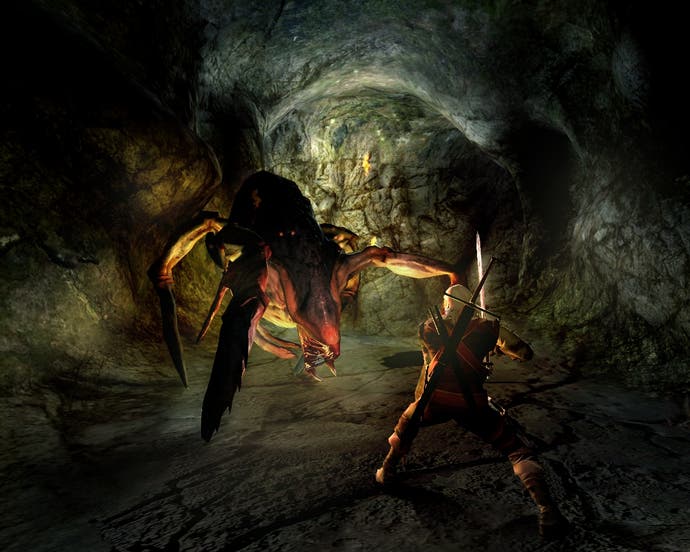
Geralt is the Witcher of the title, a mutant monster-slayer who hires himself out to the highest bidder. Handy with a sword and not too bad with spells either, Geralt is a hero to some and a murderer to others. There's a big emphasis on story in The Witcher, with the developer designing an experience more narrow and deep rather than wide and shallow. It's more concentrated, enabling the player to follow a story. What this means in terms of gameplay is that the game isn't a free-roaming experience, although it does have areas where the player can explore and take on side quests. Generally however, the game is split into chapters, with a set number of 45 locations and around 100 main quests.
Smack my witch up
Combat is also a key focus for the development team, who have created a system they believe is a natural successor to mouse clicking frenzies and turn-based attacks. It's a fairly simple system, requiring timed attacks initiated by observing the change in the cursor when hovered over an opponent. Time it right and Geralt strings combos together, showing off some of the extensive motion capture work done by CD Projekt, as enemies are despatched in spurts of blood or stunned for a further beating. Time it wrong and expect a pasting from your enemy. With the player able to switch between fast, strong and group attacks, and different swords more suitable against certain opponents, there's a tactical element for players to get to grips with. Right-click magic attacks also come into play, with standard fireball, protection, telekinetic push, enchantment and a ground-based trap on hand to compliment the melee blows, all of which can be upgraded as the game progresses.
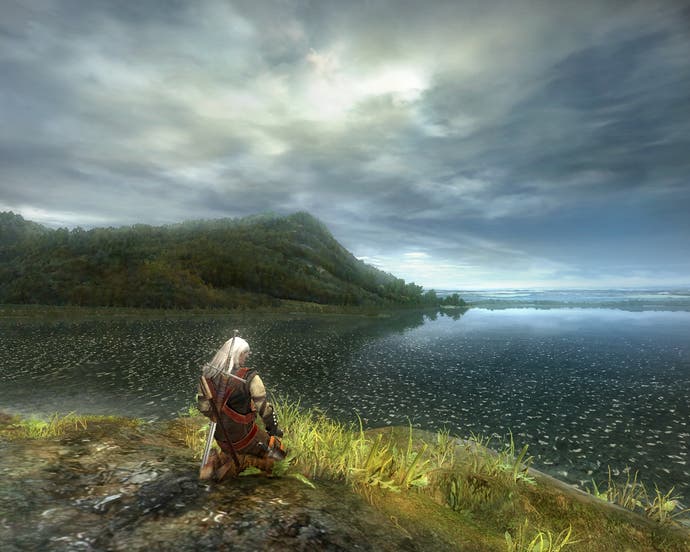
In practice it works fine. Surrounded by enemies it's fairly easy to whittle them down with group attacks before concentrating hard blows on the final survivors, and with magic attacks backing up the swordplay Geralt can maintain and keep the upper hand. There are no defensive moves though, which can feel a little harsh if you fluff your combos. Automatic parrying should kick in, and maybe it's the price you pay for being a sausage-fingered swordsman, but it would have been nice to have more control over your defensive actions.
With Geralt being a warrior, magician and an alchemist, potions are used in the game to temporarily influence his abilities. The downside is that every potion also poisons, so players can't go glugging down vials of liquid like it's Friday night. As well as influencing strength, sight, speed and other attributes, the after effects can cause blurred vision, temporary blindness or weakened abilities, forcing the player to think more carefully about the items in his inventory. Geralt also uses his alchemy skills to create potions, collecting body parts from enemies (you'll want to find a butcher's knife to get better ingredients) and picking up herbs and other items in the world. Experimentation is encouraged, but without the correct formula you can just as easily create gut-rot rather than moonshine.
Witches brew
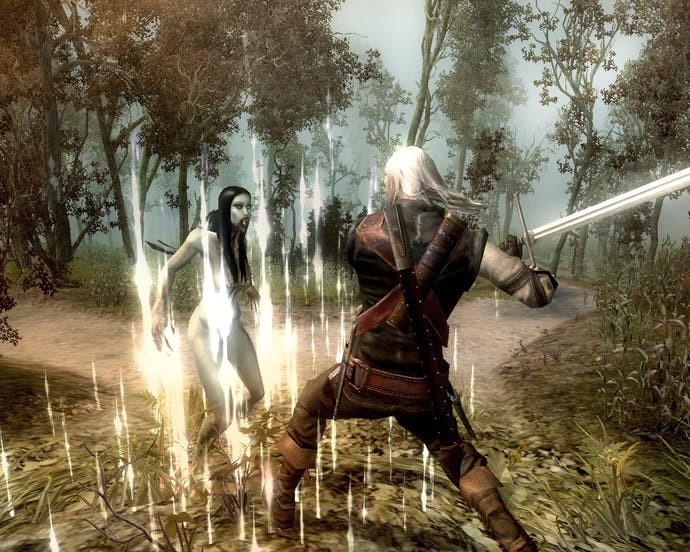
It wouldn't be an RPG without stats and The Witcher has 250 special skills with which to influence and build Geralt to your own style of play. Character attributes (agility, endurance and such), magic and fighting skills are all modified with passive and active skills. Complete quests and you'll gain experience to spend on these skills.
Passive skills allow for permanent increases, so Crushing Blow gives Geralt a more brutal attack, or Stone Skin increases endurance. Active skills are under control of the player, allowing for more deadly attacks when called upon and distinguishing Geralt as the combat veteran he's meant to be, adding flair to confrontations. Interestingly, the player cannot max out all of his stats on the first play through of the game, which CD Projekt hopes - along with the branching narrative and three different endings - will lend replayability to the game.
There are also a number of non-combat abilities and social skills that can be developed, with thievery, fist-fighting, haggling, feasting and gambling all self-explanatory. If the player increase his alcohol consumption he'll be able to drink to the same level of inebriation as certain characters, which can initiate side-quests or reveal secrets. The other skill we saw in effect was Seduction, where successfully chatting up a local wench rewarded us with a dirty porno card. Honestly, it was proper tits-out Euro smut, none of that pants-on glamour rubbish you get in the UK.
The witching hour
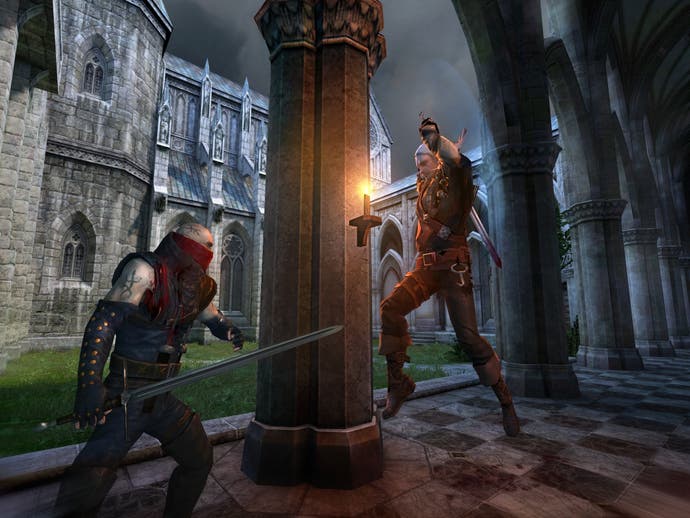
Built on BioWare's Aurora engine, the game looks impressive, and a million miles away from Neverwinter Nights. It's a dark world, but there's plenty of detail, from glowing enemy eyes to spurting, messy violence. The motion captured combat adds to the intricate artwork with dodging and acrobatic attacks a very lively alternative to turn-based bludgeoning. The Sun rises and sets throughout play, with adventures lit by moonlight or blazing sun casting significantly different shadows in environments that are begging to be explored.
Our hands on time with the game was short - one hour for an RPG is never going to be enough to properly assess the game. But what we were left with was an impressive sense of attention to detail. The Witcher doesn't feel like a generic RPG and CD Projekt has clearly taken time to work on the little things. A lot of the success of the game will hinge on the narrative and whether it's compelling and well-paced to keep the player interested. Combat is initially impressive, and with the animation already capturing the eye, the longevity of the system will hinge on whether the player will be able to feel the difference in combat as he progresses through the game.


